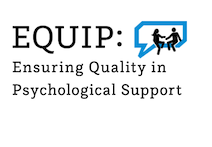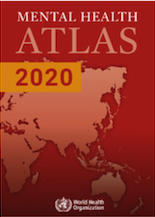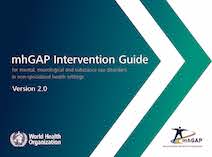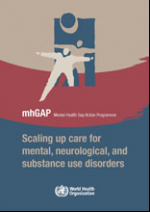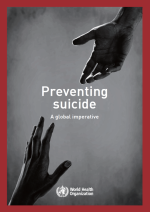Recursos
EQUIP: Ensuring Quality in Psychological Support
To ensure quality in training and supervision, WHO and UNICEF jointly developed the Ensuring Quality in Psychological Support (EQUIP) platform. EQUIP guides trainers and supervisors on how to change their existing programmes into competency-based approaches. A competency-based approach uses role plays and assessments of skills to ensure that helpers not only have the knowledge but also the skills needed to deliver quality support.
EQUIP enhances training and supervision for improved mental health and psychosocial support services. Prior to the COVID-19 pandemic, EQUIP was delivered by in-person training. The EQUIP digital platform launched in March 2022, containing guidance and e-learning tools to assess and monitor competencies in helpers to enhance training and supervision and build safe, effective, and high-quality services.
EQUIP platform can be accessed for free (click here) and is currently available in English, Spanish, Arabic, and Nepali.
World Health Organization Mental Health Atlas 2020
The Mental Health Atlas, released every three years, is a compilation of data provided by countries around the world on mental health policies, legislation, financing, human resources, availability and utilization of services and data collection systems. It serves as a guide for countries for the development and planning of mental health services. The Mental Health Atlas 2020 includes information and data on the progress made towards achieving mental health targets for 2020 set by the global health community and included in WHO’s Comprehensive Mental Health Action Plan. It also includes data on newly-added indicators on service coverage, mental health integration into primary health care, preparedness for the provision of mental health and psychosocial support in emergencies and research on mental health, as well as new targets for 2030.
Guía de Intervención para los trastornos mentales, neurológicos y por uso de sustancias
The mhGAP Intervention Guide (mhGAP-IG) for mental, neurological and substance use disorders for non-specialist health settings, is a technical tool developed by WHO to assist in implementation of mhGAP. The Intervention Guide has been developed through a systematic review of evidence followed by an international consultative and participatory process.
The mhGAP-IG consists of modules, organized by individual priority conditions, that are a tool for clinical decision-making and management. The priority conditions included are: Depression, Psychoses, Epilepsy, Child & Adolescent Mental and Behavioural Disorders, Dmentia, Disorders due to Substance Use, Self-harm/Suicide, and other significant mental health complaints. Each module presents protocols for assessment, management, and follow up for the respective condition.
The mhGAP-IG is a model guide and has been developed for use by health care providers working in non-specialized health care settings after adaptation for national and local needs.
The mhGAP-IG is available in Arabic, French, Italian, Marathi, Russian, Spanish, Thai, and Ukrainian.
mhGAP Programa de acción para superar las brechas en salud mental: Mejora y ampliación de la atención de los trastornos mentales, neurológicos y por abuso de sustancias
Mental, neurological and substance use disorders are highly prevalent and burdensome globally. The gap between what is urgently needed and what is available to reduce the burden is still very wide.
WHO recognizes the need for action to reduce the burden, and to enhance the capacity of Member States to respond to this growing challenge. mhGAP is WHO’s action plan to scale up services for mental, neurological and substance use disorders for countries, especially with low and lower-middle incomes. The priority conditions addressed by mhGAP are: depression, schizophrenia and other psychotic disorders, suicide, epilepsy, dementia, disorders due to use of alcohol, disorders due to use of illicit drugs, and mental disorders in children. The mhGAP package consists of interventions for prevention and management for each of these priority conditions.
Successful scaling up is the joint responsibility of governments, health professionals, civil society, communities and families, with support from the international community. The essence of mhGAP is building partnerships for collective action.
Prevención del suicidio: un imperativo global
Los suicidios se cobran un costo alto. Más de 800 000 personas mueren cada año por suicidio, y esta es la segunda causa principal de muerte entre personas de 15 a 29 años de edad. Hay indicios de que, por cada adulto que se suicidó, posiblemente más de otros 20 intentaron suicidarse. Los suicidios son prevenibles. Para que las respuestas nacionales sean eficaces, se necesita una estrategia integral multisectorial de prevención. approche multisectorielle de la santé publique.
El objetivo de este informe es priorizar la prevención del suicidio en la agenda global de salud pública, en las políticas públicas y concientizar acerca del suicidio como una cuestión de salud pública.
This report is available in Arabic, Chinese, English, Finnish, French, German, Japanese, Korean, Polish, Russian, and Spanish.

